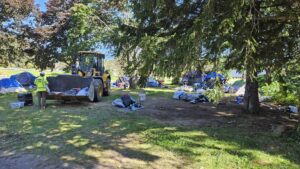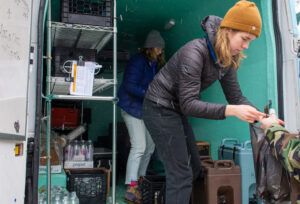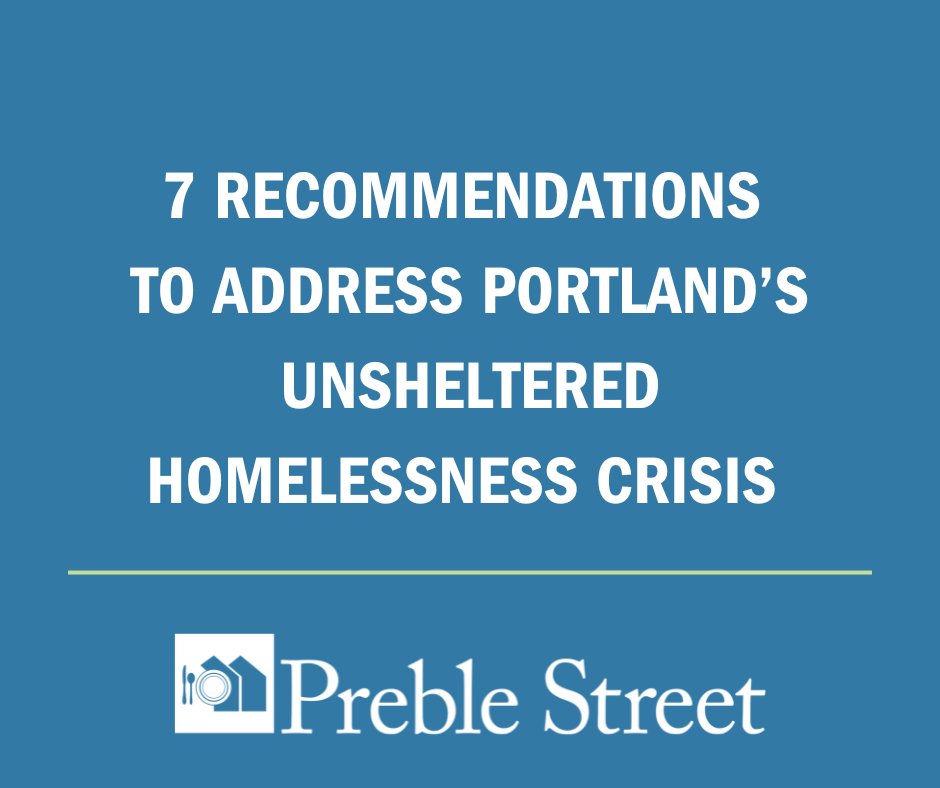Addressing Portland’s Unsheltered Homelessness:
Viable Solutions to the Crisis
Introduction
Portland is facing an unprecedented crisis in unsheltered homelessness. 216 tents with one or more individuals living inside them have been documented on the peninsula as of August 31, 2023. Other people sleep on sidewalks, in doorways, or seek safety hidden away in parks and near highways. Some sleep in their cars. Some are working but are simply unable to afford Portland’s out-of-reach housing costs. Many have serious mental illness, substance use disorders, and unmet medical needs. Most of these vulnerable people face numerous barriers to accessing care, leaving these sometimes-life-threatening medical needs untreated. The suffering and trauma our fellow human beings are experiencing, right now, here in Maine, is immense.
Encampments are a public health crisis impacting us all. Among individuals experiencing homelessness, people who are unsheltered have the worst health outcomes including early death. People with the longest experiences of homelessness, most significant health conditions, and greatest vulnerabilities are not accessing and being served by emergency shelters. Encampment sweeps disconnect people from valuable health care services and increase the risk of overdose and death. It is morally imperative that the community responds in a manner based on compassion and best practices in social work and health care.
There is a parallel unaffordable housing crisis in Portland. The median monthly cost for an apartment is $1,718. A person would need to work over 92 hours a week at minimum wage to afford this cost. The community is not affordable for countless workers, families, older Mainers with fixed incomes, and people with disabilities. Benefits like Emergency Rental Assistance, Child Tax Credits, and SNAP have all been reduced or eliminated, causing greater financial hardship, and leaving the most vulnerable individuals in our community to teeter into homelessness. Without adequate infrastructure and support for accessible, low-barrier shelter and housing, tents become epidemic.
We believe that everyone in our community can agree on one common goal — no one wants this epidemic of tents and human despair. No one.
The Encampment Crisis Response Team (ECRT) effort over the last 14 weeks led by the City of Portland, with technical assistance provided by the U.S. Housing and Urban Development Department (HUD) was joined by 14 health care, social service, housing, and civic organizations. This group demonstrated the willingness and desire to work together toward the stated ECRT Mission: “Everyone has a right to be treated with dignity and deserves access to safety, basic needs, shelter, and housing. Our goal is to resolve encampments by quickly connecting people to shelter and housing.“
The ECRT’s work to move people from the Fore River encampment to shelter or housing led to unsatisfactory outcomes with only 18 individuals moved into shelter or housing, since June 28, 2023. Lack of any new resources has severely hampered this effort. Collaboration, by itself, if not enough. For this collaboration to be effective, new resources are a necessity.
The solution to the growing number of unsheltered human beings that we are seeing in Portland is to create an improved continuum of shelter and housing options in partnership with health care. This requires a collaboration of federal, state, municipal, and private efforts. It is complex but can be done.
Preble Street has been working on solutions to homelessness for almost 50 years. Informed by best practices and led by our mission, we are recommending the following plan composed of action steps in seven areas that collectively can address this public health, housing, and shelter crisis. To make progress, it is essential that national, state, municipal, and community partners work together and that new resources are provided that include health care, case management, shelter, and housing.
Time is of the essence. The Portland community has a unique opportunity to drastically decrease encampment and unsheltered numbers with the opening of the new Riverside Shelter and its 179 new beds. Making thoughtful changes to how the HSC operates, so as to encourage more people to accept these upcoming vacancies, is the single best opportunity we have to achieve a different result than previous efforts to resolve the challenge of large encampments in our City. The cold of winter will be here soon.
Recommendations To Address Portland’s Unsheltered Crisis
1. Secure and Utilize 150 New Housing Vouchers
- Maine’s federal delegation has long supported Maine and specifically Portland’s work on providing care, shelter, and housing to people experiencing homelessness. HUD should immediately provide 70 housing choice vouchers for caseworkers to access for unhoused individuals who are ready and able to move into independent housing.
- Maine Department of Health and Human Services (DHHS) likewise should dedicate 40 Shelter Plus Care Vouchers.
- MaineHousing should direct 40 Housing Choice Vouchers to this crisis.
2. Establish an Aggressive Housing Goal to Identify Additional Housing and Shelter Options
Over the next 6 months, conduct an exhaustive search of unused housing or service properties such as long-term care and medical facilities, hotels, and dorms with an emphasis on properties owned by state, municipal, and non-profit institutions and organizations which can be used as housing or emergency shelters.
TAKE ACTION!
Contact the Portland City Council, the Governor’s office, and other Maine policymakers and tell them to support and implement this proposal!
Follow the links below to contact:
3. Move 140 Unsheltered Individuals into Shelter at HSC by December 5, 2023
- Decrease existing barriers to access the Homeless Services Center (HSC): Utilize a community collaborative implementation team and/or an Ombudsman to respond to client, outreach, caseworker, and medical provider requests regarding important operational issues at the HSC, such as curfews, all gender dorms, nighttime lighting, shuttle services etc. to ensure that those most in need of shelter can successfully utilize it.
- Implement a need-based admission prioritization for the Homeless Service Center and ensure the prioritization of high-risk individuals including those who are unsheltered with severe persistent mental illnesses and/or those who are high risk for overdose. A need-based admission policy will dramatically increase the number of unsheltered individuals accessing the HSC and can potentially be lifesaving.
- Utilize Coordinated Entry as part of a need-based HSC intake process.
- Expand shelter training for HSC staff and community caseworkers on serving individuals with complex behavioral and medical needs.
- Embed an Assertive Community Treatment (ACT) team at the HSC. This evidence-based proven model of an interdisciplinary team working with individuals with severe mental health and substance use disorders provides around the clock support and ensures that people with severe mental illness can get on-site support, rather than a restriction.
- Loan Outreach Workers to HSC: Outreach organizations could loan experienced and trusted outreach staff to the HSC for four weeks following the opening of the Riverside Shelter to assist clients from the encampments with the transition to shelter.
4. Meet Complex Needs of Unsheltered Individuals by Expanding and Improving Care Coordination
- Provide Intensive Case Management: Intensive case management is essential to support the complex needs of many unsheltered individuals and ensure that they successfully access health care, housing, or shelter. By increasing the number of case managers and providing them with the necessary time to make progress, individuals who need intensive support for housing access and stability will be able to establish the trust necessary to move forward.
- Maine DHHS should provide 5 Intensive Case Managers (ICM) to support individuals who need intensive support for housing access and stability. ICMs will continue to work with the individual once housed to ensure housing stability and prevent returns to homelessness.
- Create a community task force to lead and support the transition of asylum-seeking and immigrant individuals to the new Riverside Shelter based on that population’s specific needs.
- Follow the ECRT communication and coordination model with full participation from federal, state, municipal, and community-based organizations.
- Support existing low-barrier shelters and the creation of others: Elena’s Way, a 40-bed Preble Street Wellness Shelter opened in late 2022 and at capacity, is the only shelter in Portland that specifically focuses on the population of people experiencing homelessness and complex physical and behavioral health needs who cannot access any other shelter.
- Increase current medical health care outreach and treatment efforts. Expand coordination between health care service providers including Greater Portland Health, the Maine Medical Center Preble Street Learning Collaborative, City of Portland Mobile Medical Outreach, and Northern Light Health Care to maximize each team. Consider case conferencing to discuss the most medically high risk and vulnerable.
- When a death in an encampment occurs, have care teams meet to debrief and review what could have been done differently to prevent this loss.
5. Add 20 Additional Homelessness-focused Positions over the Next 12 Months
- Create Encampment Health Home teams: Building on the new HOME Community Care Team model which maximizes federal Medicaid funding, DHHS could provide technical assistance and support to create a unique interorganizational team among the agencies that provide outreach to the encampments.
- Expand PATH: DHHS could provide 3 additional PATH caseworkers who specialize in working with unsheltered individuals with behavioral health needs.
- Add Rapid Rehousing casework staff: Support MaineHousing’s recent effort to provide additional Rapid Rehousing caseworkers specifically directed to the encampments.
- Expand medical health care outreach and treatment efforts, increasing the frequency of medical outreach contacts and expanding services available on site in encampments to include clinical mental health and peer services.
- Integrate Hospital Community Impact Funds: Utilize local hospitals’ Community Impact Funds to create additional medical outreach teams.
6. Increase Impact, Education, and Transparency through Increased Communication
- Review emerging best practices on resolving encampments monthly. Track output data and utilize to inform ongoing work.
- Improve public perception of the HSC among unsheltered individuals: Drawing on the expertise of communications staff from shelter and outreach providers, elicit a collaborative effort in creating an educational campaign targeting individuals in the encampments on changes to the HSC, making it accessible and more attractive to unsheltered individuals.
- Improve awareness of outreach staff and people living in encampments to the schedule and what services each medical team can offer including but not limited to: primary care, psychiatric care, treatment for substance use disorders, wound care, medication management, etc. Focus on developing peer/people with lived experience as a resource. Hire those with addiction, incarceration, and/or psychiatric hospitalization histories to provide training and support.
7. Develop Creative Strategy to Secure Additional Wrap-Around Funds
- Create a flexible wrap-around service fund: All partners including federal, state, municipal and community-based organizations will fiscally support this fund.
- Create a fund specifically for BIPOC individuals in the encampments.
With federal, state, municipal, and private community partners providing resources and joining together in this plan of seven strategic areas of focus, Portland will return to being a community where individuals facing homelessness are sheltered or housed. With 179 new shelter beds becoming available and a transition to a need-based prioritization system utilizing Coordinated Assessment in the HSC intake process, people will be sheltered and the need for encampments dissipated.
Read more

Unsheltered homelessness: To solve – not resolve
Preble Street calls for a postponement of the September 6 sweep of the Fore River encampment to allow more time for outreach staff to find shelter and housing for the people staying there. For the safety of all, we must focus on increasing the resources available to people staying in encampments including the number of

Unsheltered homelessness: No simple answers
The chalk writing on the doors near the Bayside Trail says, “I’m so ignorant to think we’d make it out of this thing TOGETHER…or alive.” The hearts surrounding the message give hope, but the ‘or alive’ just scratches the surface of the despair we all feel knowing that there is no ready, short-term solution for

Addressing unsheltered homelessness in Maine
No one should have to live outside, but that is what is happening to an unprecedented number of Mainers right now. In Portland, the Parks Department recently counted 102 tents set up by people experiencing homelessness — a new record for the area. The encampment on the Bayside Trail is a visual representation of the fact

